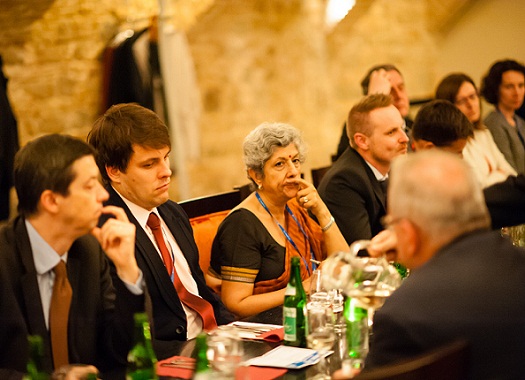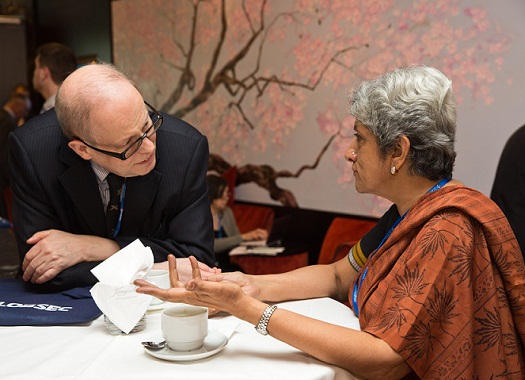I was fortunate to be invited to participate in the 9th annual GLOBSEC 2014 this year. The Bratislava Global Security Forum, held in May every year, is the premier security forum for central and eastern Europe. This year, it should have attracted even more attention given the events in Ukraine and the focus of the U.S. and NATO on countering the Russian annexation of Crimea. While the logistics in Bratislava – one of the lesser known but beautiful capital cities in Europe – were superb, the breadth of perspectives represented at the forum left something to be desired.
As last year, the overarching theme was the insecurity felt by countries – former members of the Soviet Union, especially the smaller ones, like the Baltic republics and the caucuses that are not yet members of NATO. Representatives from eastern Europe were also interested in developments in the breakaway regions of eastern Ukraine, caused to some extent by the ineptitude of the government in Kiev.
Much in evidence was Anglo-Saxon derision for what was projected as a challenge by Russia to the extant rule-based global order. Since many of the panels were moderated by journalists associated with publications like the Economist, there was a strong articulation that Russia, recently characterised with some truth by U.S. president Barack Obama as “only a regional power”, must be shown its place in the global pecking order. Ignored entirely was the overwhelming contribution of the Soviet Union to the defeat of Nazi Germany and the emergence of the same post-war global order from which it was kept out until the end of the Cold War, over half a century later.
In my opinion, the discussions would have been enriched with some representation of Russian concerns about NATO creeping up to its borders, German reticence over the critical energy relationship with Russia and even the Chinese standpoint on the depth of western hostility towards Russia. I was glad that there were two of us from India who could at least argue in smaller group discussions that we have a different historical experience of the Soviet Union/ Russia than the more troubled interactions of east European countries with communist Russia.

Some misgivings were expressed that Germany was not as strident in its pronouncements of support for the government in Ukraine, enhanced sanctions on the Russian energy and financial sectors as well as militaristic posturing. This seemingly pre-emptive criticism of Germany is exaggerated, considering the public positions taken by the German chancellor Angela Merkel and the country’s concurrence with the sanctions imposed by other NATO countries on individual Russians.
Efforts by French and Hungarian participants to recall that mistakes were made by the European Union (EU) itself in the lead-up to ousted Ukrainian president Viktor Yanukovich’s last-minute backing away from the Association Agreement with the EU, as well as the ineptitude of the Arseniy Yatseniuk government in Kiev were simply ignored.
The most surprising was the psychobabble about the mind of the Russian president Vladimir Putin and his alleged plan to wage an information war in order to separate the Anglo-Saxon world from continental Europe. This cannot take Europe and NATO towards a resolution to the situation.
More seriously there were assertions that not disrupting the presidential elections in Ukraine, scheduled for May 25 was a red line that Russia must not cross. But everyone in Bratislava knew that the real red line was Article 5 of the 1949 North Atlantic Treaty that calls for a military response to the violation of the territory of a NATO member state. Since Ukraine is not (yet) a member of NATO it means that there will continue a lot of bluster but no military action as was the case with Georgia in 2008.
As it turned out, Russia undertook to respect the outcome of the presidential election which went off reasonably well. But some eastern regions which held referenda to declare autonomy from the government in Kiev are experiencing continuing violence, and refused to participate in or recognise the election of new president Petro Poroshenko. President Obama has meanwhile announced in Poland, the creation of a $1 billion European Reassurance Initiative, but no significant increase in the presence of American troops in eastern Europe.

Serving NATO secretary general Anders Fogh Rasmussen was awarded the Annual Czech and Slovak Transatlantic Award. Unfortunately, his keynote address was harshly critical, asserting that his message to Russia was that “today, NATO is both able and willing to do whatever is necessary, for as long as necessary”. There was much anticipation that the mission of the NATO meeting in September will be to save the current world order – which would definitely not secure the interests of countries like Russia and developing countries like China and India. Perhaps, the switch of NATO leadership to former Norwegian Prime Minister Jens Stoltenberg may make the organisation less confrontational.
Neelam Deo is Co-founder and Director, Gateway House: Indian Council on Global Relations; She has been the Indian Ambassador to Denmark and Ivory Coast; and former Consul General in New York.
This blog was exclusively written for Gateway House: Indian Council on Global Relations. You can read more exclusive content here.
For interview requests with the author, or for permission to republish, please contact outreach@gatewayhouse.in.
© Copyright 2014 Gateway House: Indian Council on Global Relations. All rights reserved. Any unauthorized copying or reproduction is strictly prohibited


